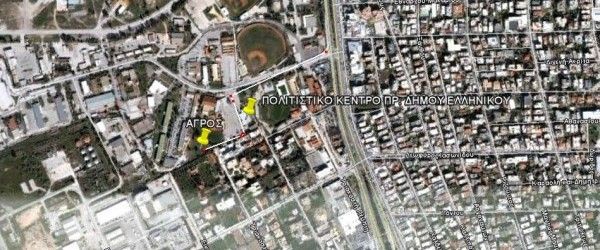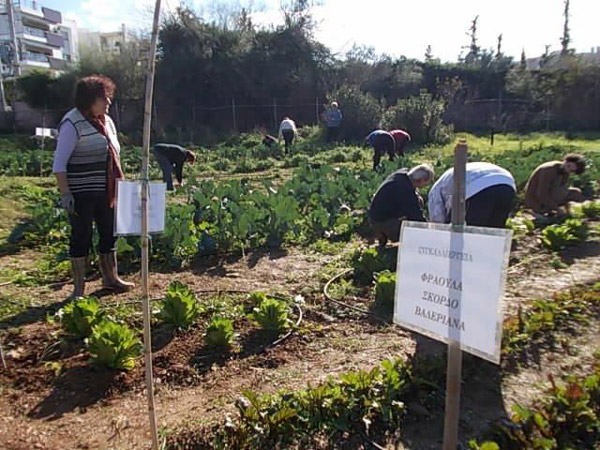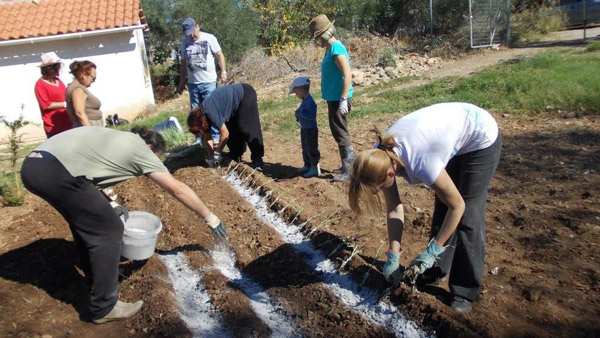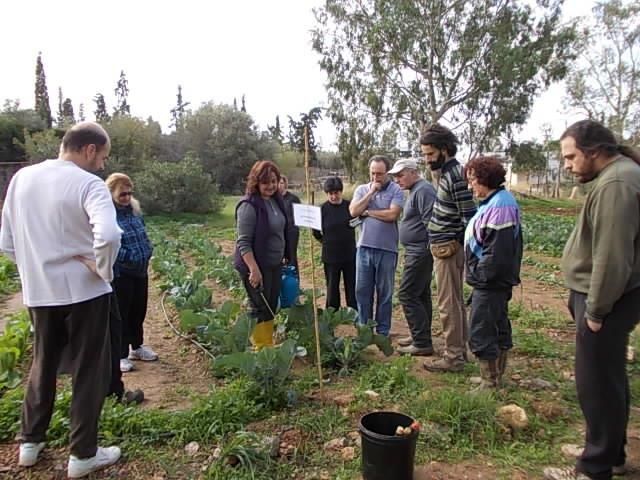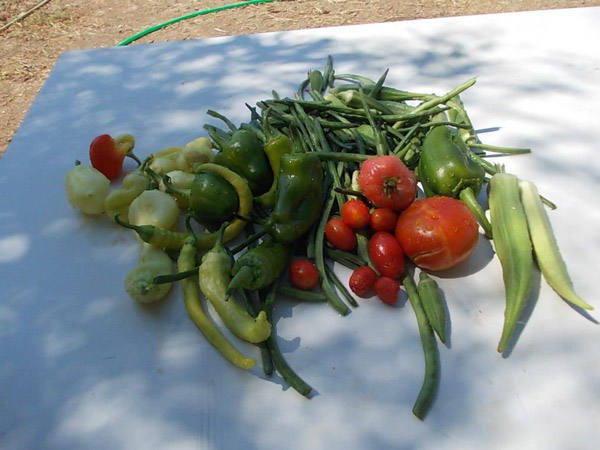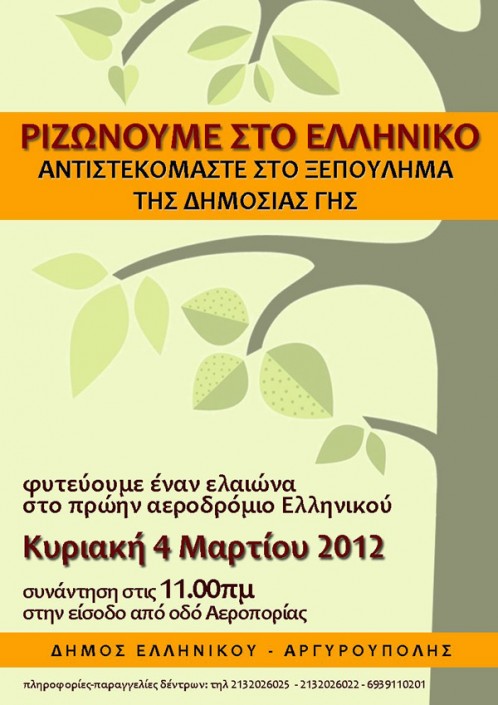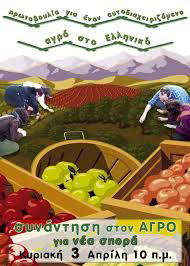Guerilla gardening in the city. The self-managed field of Elliniko
Anthopoulou Theodosia|Kolokouris Orestis|Kousoulenti Chrysa
Quartiers, Social economy
2015 | Dec
In the early 1970s, in response to the continuous degradation of the city, Liz Christy and the “green guerilla” team decided to sow seeds in vacant plots, to place flower boxes in abandoned buildings and to plant sunflowers in the busy streets of New York. At the intersection of Bowery and Houston Street in Manhattan, a large abandoned vacant lot became the first Community Garden in the history of guerilla gardening, the Bowery Houston Community Farm and Garden (http://www.lizchristygarden.us/). Today, more than 600 Community Gardens in New York and a vast movement of active citizens around the world bring together residents-growers. They are (re)claiming urban land and public areas, with the aim to resolve problems in neighbourhoods and cities via collective action (www.greenguerillas.org).
Guerilla gardening relies on transcendence, activism and spatial intervention. Groups of citizens acting spontaneously, anonymously and voluntarily, sow and plant forgotten open city spaces (abandoned plots, neglected lawns and flowerbeds of trees on pavements) without authorisation. Their act is a criticism of the bourgeois capitalist system (Crane, 2011).The urbanite spirit of defiance, as expressed by the mass uprisings and civil movements (May 1968 and student riots, antiwar and anti-racist movements, environmental movement, etc.) has shaped an ideology and culture concerned with the urban landscape, social rights, communalism, the nutritional risks of industrialised agriculture, the demand for “clean food” etc. Guerilla gardening is part of the city movements that defend public areas and the right to the city, challenging the dominant modes of production and reproduction of urban space and claiming participation in planning (Zanneti 2010, Eizenberg 2013).
In its most radical form, as a movement acting outside the institutional and sometimes the legal framework (e.g. occupation of open spaces) it has a distinct political profile. Its demands are directly related to institutional power and urban governance in the context of public uses of land. It promotes self-organisation, direct democratic processes, equality and active participation in the management of public space through eco-activism and the creation of community gardens. The non-mainstream press, websites and social media operate as the main hubs for bringing together, informing and multiplying guerilla gardening movements across the world (Tracey 2007). The mainstream media have showed delayed interest in guerilla gardening -and usually refer to it as an innovative aesthetic intervention.
In Greece, the “Synkalliergoume” (Let’s Grow Together) website – a meeting place for urban agriculture groups – declares that “as long as such initiatives of self-managed collective gardens based on organic farming exist, the demand for a different lifestyle is better expressed: it is a demand to move on from dependence on the socio-economic system to self-management, from passive consumption to production, from isolation of the individual to the group. Together we all give small, but concrete examples of another city. We rebel, throwing green bombs in the barren cement landscape” (http: // synkalliergoume. blogspot.gr/).
The “Self-managed Field in Elliniko” is an independent collective of citizens founded in early 2011. Since then, it cultivates an area of 2.500 sq.m. on the site of the former USAF Base, in an effort to respond to the social, economic and environmental crisis afflicting Athens. The objectives of the self-managed field relate to the struggles for preventing the privatisation and commercialisation of the former Elliniko airport and are part of wider social economy and solidarity initiatives. The collective managing the field endorses the call for the creation of a Metropolitan Park and the development of public, sports and cultural activities. Ideas for developing a Metropolitan Park were prepared as unofficial proposals after the international airport moved to Spata at a time when major Olympic projects (2003) were developed on site. The Metropolitan Park proposals were eventually abandoned due to the economic crisis when the HRADF leased the Elliniko site to private investors for residential and business development.
The main principle guiding the “co-farmers” and the supporters of the Field of Elliniko is that “man and nature are above profits, where life, pluralism, self-management, environmental and social justice define an economy of solidarity diversified from the model of the current political, economic and social organisation, which is characterised by greed, competition, individualism and violence against people” (http://agroselliniko.blogspot.com)
The Field of Elliniko is an ecologically managed social vegetable garden, in a space allotted with the consent of the City Council of the Municipality of Elliniko-Argyroupoli. The main objectives of the Field are the expansion of organic farming within the fabric of cities, the preservation and promotion of traditional seeds from across Greece, the exchange of knowledge with other organic farmers, the assistance to social groups in need, the reinforcement of social activities and the expansion of cultivation in other open spaces. The traditional seeds come from the “Pelliti” community, from other organic farmers and friends of the Field of Elliniko that bring them from their villages. A seed bank also operates, which comprises several endangered varieties. Natural methods are used for crop protection and fertilising. These include the use of manure and self-produced compost, ash, nettle juice and other naturally occurring subtances, as well as combined cropping and crop rotationThe main group of co-farmers, working systematically for the care of the Field of Elliniko is a team of about twenty people out of a total of about 100 volunteer friends. Decisions in the Field of Elliniko are taken through regular open meetings in accordance with the principles of direct democracy, equity and self-organisation.
The vegetables produced (tomatoes, lettuce, aubergines, peppers, collard greens, etc.) are made available to the social services of the Municipality of Elliniko and civil society organisations for distribution to needy residents, to charitable institutions providing soup kitchens, to the Social Grocery and to collective kitchens. However, production is not an end in itself. The nature of the Field of Elliniko is mainly demonstrative and educational. “We are not interested in the destination, but in the journey of experiences and knowledge” (Panagiota Maltezou, agronomist of the Field of Elliniko and co-farmer).
Today, in less than four years of operation, the self-managed Field of Elliniko welcomes and educates students from schools of all levels, contributes with its cumulative knowledge in the creation of school vegetable gardens, distributes Greek traditional seeds for free, raises awareness on issues of agroecology and actively participates in setting up an olive grove in an adjacent area.
The collectivity of the Field of Elliniko promotes productive uses in urban space as opposed to consumerism uses and the prevention of further construction on existing open spaces.It is a meeting place for socialising and political expression for participating ‘co-farmers’. Their key incentives for participation are the work on organic farming as well as the political and social action of the Field of Elliniko. “I particularly enjoy working with the land. As a child, I used to go to my father’s field… we sold it later, but I never got over it. Now it is something I enjoy, it is mentally relaxing. Besides, I also agree with the reason why the Field of Elliniko was created… it is a pity to waste our land and sell it to investors” (Giorgos, co-farmer).
Entry citation
Anthopoulou, T., Kolokouris, O., Kousoulenti, C. (2015) Guerilla gardening in the city. The self-managed field of Elliniko, in Maloutas T., Spyrellis S. (eds) Athens Social Atlas. Digital compendium of texts and visual material. URL: https://www.athenssocialatlas.gr/en/article/guerilla-gardening/ , DOI: 10.17902/20971.31
Atlas citation
Maloutas T., Spyrellis S. (eds) (2015) Athens Social Atlas. Digital compendium of texts and visual material. URL: https://www.athenssocialatlas.gr/en/ , DOI: 10.17902/20971.9
References
- Crane A (2011) Intervening with agriculture: a participatory action case study of guerrilla gardening in Kingston, Ontario. Queen’s University.
- Eizenberg E (2013) From the Ground Up: Community Gardens in New York City and the Politics of Spatial Transformation. VOLUNTAS: International Journal of Voluntary and Nonprofit Organizations 25(3): 844–846. Available from: http://link.springer.com/10.1007/s11266-013-9409-y.
- Tracey D (2007) Guerrilla Gardening: a manualfesto. 1st ed. Cabriola Island, Canada: New Society Publishers.
- Zanetti O (2007) Guerrilla Gardening: Geographers and Gardeners, Actors and Networks: Reconsidering Urban Public Space. Available from: http://www.guerrillagardening.org/books/ZanettiGG.pdf.
Related internet sites:
Information on community vegetable gardens and guerrilla gardening
- http://www.communitygarden.org/
- http://www.greenguerillas.org
- http://www.guerillas.org/
- http://www.lizchristygarden.us/
Information on guerrilla gardening in Greece and on the vegetable garden in Elliniko

